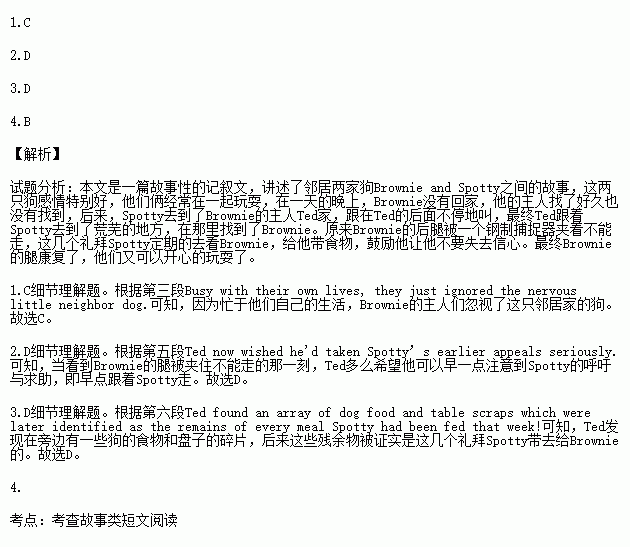题目内容
Brownie and Spotty were neighbor dogs who met every day to play together. These two loved each other and played together so often that they had worn a path through the grass of the field between their respective houses.
One evening, Brownie’s family noticed that Brownie hadn’t returned home. They went looking for him with no success and by the next week he was still missing.
Curiously, Spotty showed up at Brownie’s house alone. Barking, whining (哀叫) and generally pestering (纠缠) Brownie’s human family. Busy with their own lives, they just ignored the nervous little neighbor dog.
Continuously,Ted, Brownie’s owner, was disturbed by the angry, determined little dog. Spotty followed Ted about, barking insistently, then rushing toward a nearby empty lot and back, as if to say, “Follow me! It’s urgent!”
Eventually, Ted followed Spotty to a deserted spot half a mile from the house. There Ted found his beloved Brownie alive, one of his hind legs crushed in a steel leghold trap. Horrified, Ted now wished he’d taken Spotty’s earlier appeals seriously. Then Ted noticed something quite remarkable.
Spotty had done more than simply led Brownie’s human owner to his trapped friend. In a circle around the injured dog, Ted found an array of dog food and table scraps which were later identified as the remains of every meal Spotty had been fed that week!
Spotty had been visiting Brownie regularly, in the hope of keeping his friend alive by sacrificing his own comfort. Spotty had evidently stayed with Brownie to protect him from hunger and other dangers, and keep his spirits up.
Brownie’s leg was treated by a veterinarian (兽医) and he recovered. For many years thereafter, the two families watched the faithful friends chasing each other down that well worn path between their houses.
1.Why did Ted pay little attention to Spotty at the very beginning?
A.Because Ted was tired of listening to Spotty barking.
B.Because Ted only cared about Brownie’s safety.
C.Because Ted was not free at that moment.
D.Because Ted knew where Brownie was.
2.When Ted was led by Spotty to Brownie, he .
A.was curious to find out what had happened
B.highly appreciated Spotty’s help
C.was worried about Brownie’s health
D.regretted not following Spotty earlier
3.Not only did Spotty help Ted find Brownie but also .
A.he went to see his friend and played with him secretly
B.he sent messages to some other persons in his community to save his friend
C.he managed to lead a veterinarian to treat his friend
D.he sent food to his friend, accompanied him and inspired him to cheer up
4.What can we learn from the story?
A.Barking dogs seldom bite.
B.A friend in need is a friend indeed.
C.Love me, love my dog.
D.Every dog has its day.
 小学教材全测系列答案
小学教材全测系列答案
